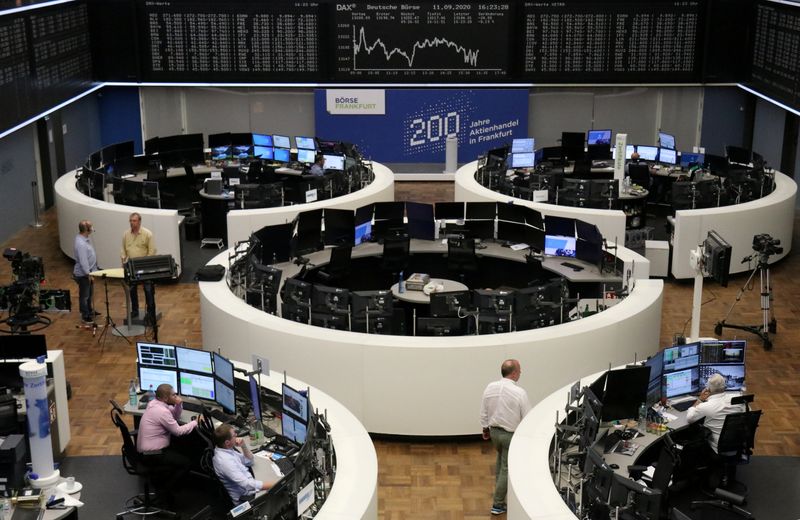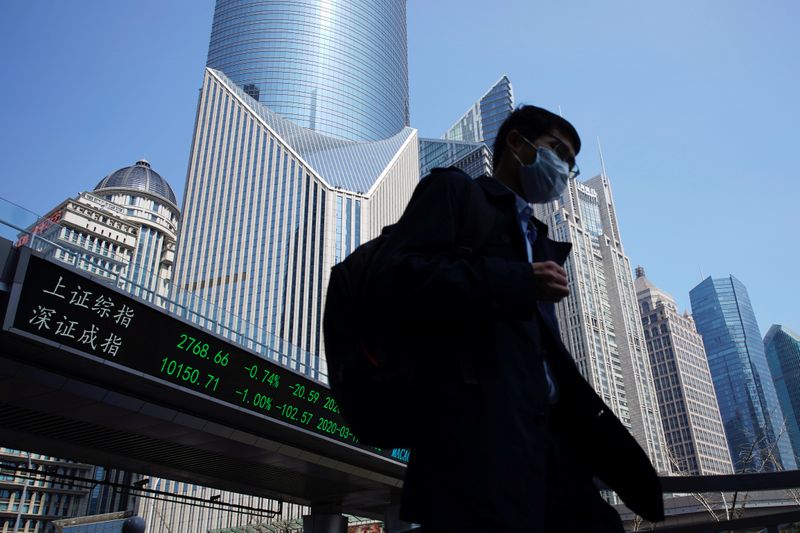By Elizabeth Howcroft
LONDON (Reuters) - European shares fell on Monday as rising COVID-19 infection rates in Europe prompted renewed lockdown measures in some countries, casting doubt over the economic recovery, with a lack of U.S. stimulus also weighing on sentiment.
The MSCI world equity index (MIWD00000PUS), which tracks shares in 49 countries, was down 0.5% at 0748 GMT.
European indexes opened lower, with the pan-European STOXX 600 down 1.7% (STOXX), at its lowest in nearly two weeks. London's FTSE 100 was at a two-week low, down 2.4% (FTSE) and Germany's DAX fell 2% (GDAXI).
Banking shares slid after a media report on how several global banks moved large sums of allegedly illicit funds over nearly two decades.
HSBC [HSBCUK.UL] shares sunk to a 25-year low in Hong Kong.
Investors are becoming more cautious about Europe, amid a sharp uptick in new COVID-19 cases. European countries including Denmark, Greece and Spain have introduced new restrictions on activity.
Britain is considering a second national lockdown as new cases rise by at least 6,000 per day.
Germany's health minister said the rising new infections in countries like France, Austria and the Netherlands is worrying.
Investors will be looking ahead to flash PMI data on Wednesday for the first hints of how economies have fared in September.
"Concerns are rising that the summer recovery is probably as good as it gets when it comes to the recent rebound in economic activity," wrote Michael Hewson, chief market analyst at CMC Markets UK.
"This reality combined with the growing realisation that a vaccine remains many months away, despite President (Donald) Trump's claims to the contrary, has made investors increasingly nervous, as we head into an autumn that could see lockdowns reimposed," he said.
The dollar declined for the second week running last week, hurt by the U.S. Federal Reserve's commitment to keeping rates lower for longer.
It was trading less than 0.1% up against a basket of currencies at 92.997 at 0750 GMT (=USD).
Seven members of the Fed will speak this week - including chairman Jerome Powell appearing before Congressional committees - so investors will be looking for hints to determine the dollar's direction.
The safe-haven yen was in its sixth consecutive session of gains versus the dollar, up around 0.4% at 104.185
Japan has public holidays on Monday and Tuesday this week, meaning volumes are thin in Asian trading.
The euro was flat against the dollar at $1.18325 (EUR=EBS), while the safe Swiss franc rose against both the dollar and euro (EURCHF=EBS)
The benchmark 10-year German government bond yield was down 2 basis points at -0.507% (DE10YT=RR), with most high-rated euro zone government bond yields down by a similar amount.
The European Central Bank will review how long its emergency pandemic bond-purchase scheme should go on, the Financial Times reported.
The European Council meets in a summit on Thursday and Friday this week.
Elsewhere, oil prices fell, with Brent crude (LCOc1) down 1.8% at $42.39 a barrel at 0745 GMT, while U.S. crude (CLc1) was down 1.9% at $40.34 a barrel.

Gold prices edge higher, helped by the weaker dollar, with spot gold
